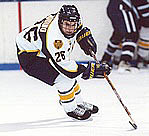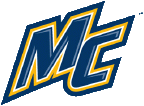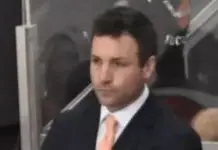The immediate fate of both the Merrimack hockey team and its star player was put in the hands of a federal court judge today.
During a deposition hearing in Detroit, U.S. Federal Court Judge Victoria Roberts was scheduled to hear arguments from attorneys representing both the National Hockey League Players Association and Ontario Hockey League in a lawsuit filed by the players union a year ago.
The only individual plaintiff named in the case is Merrimack senior captain Anthony Aquino, a 2001 third-round draft pick of the Dallas Stars.
The suit contests the major junior league’s rule that prohibits 19- and 20-year-old U.S. college hockey players whose rights are owned by an OHL club from leaving school in order to play in the 20-team league. Major junior hockey, seen as a development level for professional-caliber players, is restricted to registered Canadian Hockey Association and USA Hockey players usually between the ages of 17 and 20.

Two of the three major junior leagues in Canada allow for overage (players in their 20th year of life), nonregistered players to return from U.S. colleges and join the team that owns their draft rights. Two years ago, the OHL instituted a rule prohibiting such a move to which the NHLPA objected, contending it limits future NHL players’ earning potential.
In a loop hole that threatens U.S. college hockey, players drafted by an NHL club can become free agents after playing one year of major junior hockey. After that year, players are free to accept contract offers from any of the 30 NHL clubs instead of being forced to negotiate solely with the team holding their rights.
In contrast, NHL clubs retain a player’s draft rights throughout his entire college career.
The loop hole was first exposed in the case of former Michigan defenseman Mike Van Ryn. He was drafted — and his rights owned — by New Jersey. When he went to the OHL in an attempt to get out of his contract, New Jersey contended it still owned his rights for four years — or the length of time had he stayed in college. But an arbitrator ruled that, once he left college, he would be a free agent after one year.
The OHL then closed the loop hole by restricting players not previously in the league from playing as over-agers.
In Aquino’s case, NHL players association attorneys argued the motion asking that the OHL’s rule not apply to the 2002 New England Division I first-team all-star for the upcoming season.
Such a decision would allow the 20-year-old to leave Merrimack and join the Oshawa Generals, becoming an NHL free agent at the end of the season.
“I’m trying to maximize my options,” said Aquino last month after deciding to become an individual plaintiff in the case. “It has nothing to do with Merrimack. I love everything there. It’s nothing that they’ve done.
“The NHL team that owns my rights is known for signing a lot of free agents,” said Aquino, who has scored 56 goals and 115 points in three seasons at Merrimack, “so it’s not definite that I will even play for them some day. That’s why I’m trying to maximize my options.”

A source familiar with the case said Aquino requested it be heard in federal court on an expedited basis so that a decision could be made
prior to Sept. 3. That way, if the OHL rule were upheld, Aquino would be
able to attend the first day of classes at Merrimack on Sept. 4 and retain
his college eligibility.
Originally, Michigan senior Mike Cammalleri, a boyhood friend of Aquino, was also named as a plaintiff in the case until he signed a multi-year contract last month with the Los Angeles Kings. Cammalleri was a second-round pick of the Kings in the 2001 NHL Entry Draft.
“I wouldn’t say this is his only avenue, but it’s his avenue of choice,” a source close to Aquino said. “It’s quite simple though: If the court allows the application of the motion to be successful, Anthony will likely pursue that avenue. If the court doesn’t allow it, he’ll likely choose to go back to Merrimack.”
Merrimack team officials admit anxiously awaiting a decision.
“There’s no replacing Anthony,” said head coach Chris Serino. “We’ll see what happens.”


